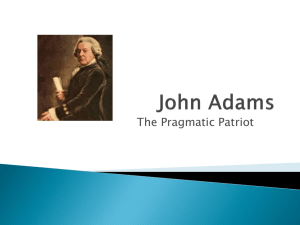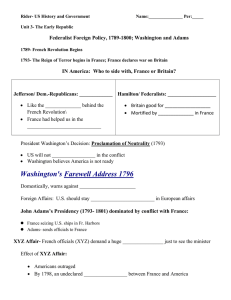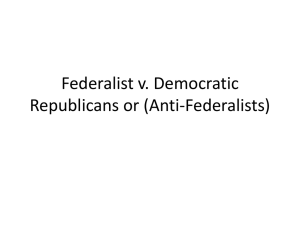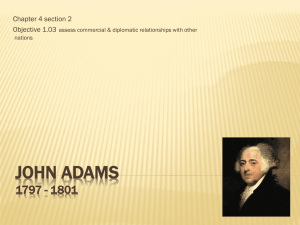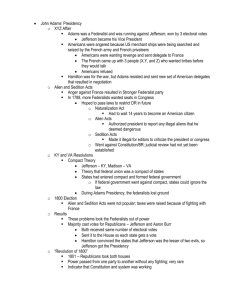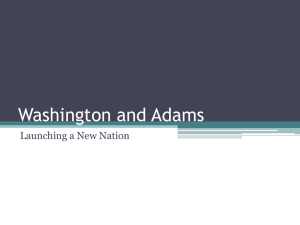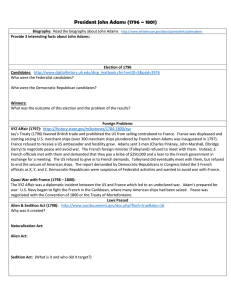JOHN ADAMS ADMINISTRATION
advertisement
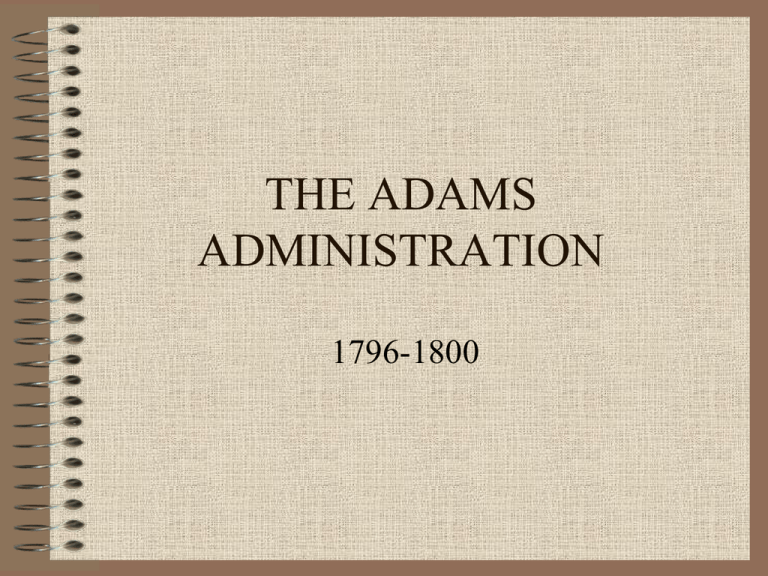
THE ADAMS ADMINISTRATION 1796-1800 • ELECTION OF 1796: • FEDERALISTS • John Adams • Thomas Pinckney • REPUBLICANS • Thomas Jefferson • Aaron Burr • According to the Constitution, each man received votes separately instead of as a ticket. • Adams—71 • Jefferson—68 • Pinckney—59 • Burr—30 • Others--48 • John Adams became President and Thomas Jefferson became the Vice-President. JOHN ADAMS’ CREDENTIALS • Contributed to preRevolutionary agitation in Boston • Delegate to the Continental Congress • Helped draft the Declaration of Independence • Helped negotiate the Treaty of Paris • First ambassador to Great Britain • Adams lacked Washington’s skill as an executive leader; he tended to make decisions on his own without consulting Congress or the Cabinet. He agreed with Washington’s view of political parties. EVENTS OF THE ADAMS’ ADMINISTRATION • The American relationship with France continued to deteriorate. The dictatorial board ruling France (The Directory) cut off diplomatic relations with the U.S. THE XYZ AFFAIR • 3 men (including John Marshall) were sent to negotiate an end to the impending conflict with France. These men communicated through 3 intermediaries known as X, Y, and Z. • The French agents told the Americans that they would have to pay $250,000 to be heard. France also demanded an apology from Adams for criticizing France and the government’s assumption of debts owed to France by U.S. citizens. The Americans refused and returned home. • The U.S. fought an undeclared war (Quasiwar) with France from 1798-1800. The U.S. navy dominated the French, sinking warships and recapturing American vessels taken by the French. These victories gained support for the Federalist Party. ALIEN AND SEDITION ACTS • The Federalist majority in Congress passed a series of acts to limit the rights of immigrants and critics of the Adams administration. ALIEN ACT • The president could deport any non-U.S. citizen he judged to be a danger to the country. This act was not enforced by the president. SEDITION ACT • Permitted imprisonment and fines for criticizing the government and applied to U.S. citizens and aliens. It was enforced, mainly against Republican newspapers. VIRGINIA AND KENTUCKY RESOLUTIONS • Anonymously written by Thomas Jefferson and James Madison • Argued the Acts violated the First Amendment • These resolutions suggested the theory of NULLIFICATION, the idea that a state had the right to veto a federal law it considered unconstitutional. • John Adams eventually made peace with France, which caused him to lose the support of his own political party (the Federalists). ELECTION OF 1800 • FEDERALISTS John Adams Charles Pinckney • REPUBLICANS Thomas Jefferson Aaron Burr • Republicans lined up votes in the electoral college without thinking of the constitutional problem of no provisions for party slates—a tie occurred between Jefferson and Burr. • • • • • Jefferson—73 Burr—73 Adams—65 Pinckney—64 John Jay--1 • Burr refused to step aside, and the election was decided by the House of Representatives. Hamilton led the Federalists in the House to elect Jefferson. • Hamilton on Burr: “Burr loves nothing but himself; thinks of nothing but his own aggrandizement, and will be content with nothing short of permanent power in his own hands.” • Thomas Jefferson won the election of 1800 and became the third president of the U.S.

